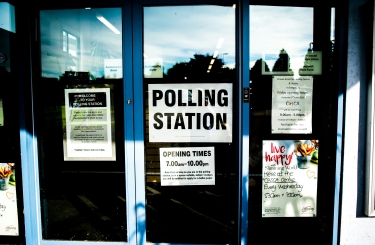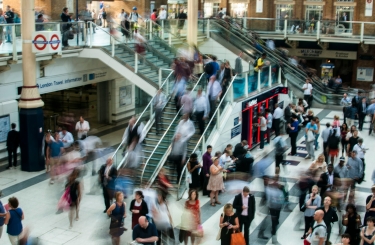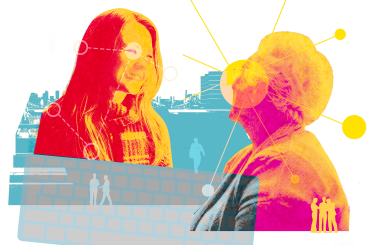

I won’t be the only one who woke up this morning somewhat bleary eyed after staying up to watch the results of yesterday’s election. Others will be talking this morning about the size of the landslide and the shifts in public opinion that brought us here, but as the dust starts to settle we know the new government will be keen to get to work – but what does this mean for our members, our city, our communities?
In the run up to the election there’s been the usual speculation about what a change of national government could mean for the country, and we’ve been paying particular attention to the implications for London and the many different communities who live and work here. Over the past few weeks many of the conversations I’ve had with our members inevitably touched on what the (then anticipated) result might mean for the organisations they support, as well as the wider funding landscape.
On the one hand, what emerged from some of these conversations was a sense of optimism about a re-imagined role for civil society and a more open door for engagement with national government. Some of our members and community partners have talked about their hopes for a more collaborative approach to policy development, a shift from the ‘outsider’ position they’ve found themselves in, to being more directly and meaningfully involved.
There have also been some encouraging noises about how a new government might introduce measures to boost the potential of philanthropy, even if the Labour manifesto lacked detail on how it might do this. An acknowledgement to improve the ‘strategic collaboration’ between government and philanthropy was largely welcomed earlier this week, particularly where this could create stronger routes in for social investment and incentivising philanthropic giving.
But when it comes to bolder commitments to support and invest in civil society, most of the people I’ve spoken to have been disappointed – something echoed by the Directory of Social Change in their helpful ‘Manifesto Mashup’ which found ‘depressingly little’, from any of the major parties about initiatives to support charities, civil society, social enterprise, or volunteering (the NCVO manifesto is a good place to see some of the asks the sector has put forward for how a new Government could act on this).
The reality is that across London, community organisations are shutting each week: the relentless effects of disinvestment in wider local services at a time when need demand is through the roof have left many at breaking point. Funding from our members is plugging the gaps left by failures elsewhere in the system, and a consistent ask for the new government from many sector bodies has been to significantly increase investment in local government, so that public services can adequately meet current and future demand. The LGA have called the current system of funding local government ‘out of date, opaque, overly complex’, and in need of urgent reform. They’ve called for multi-year financial settlements to give local areas more certainty, and enable them to focus on long term strategic and economic planning.
This is certainly something backed up by the conversations I’ve had, particularly with public sector members. But the other major thing that’s stuck out is that without immediate steps to tackle some of the extreme inequalities in London, efforts being made to create positive change elsewhere will be undone, at great expense to individuals and our collective endeavours.
At a meeting we convened with some of the big funders of civil society last month, there was a sense of deep frustration at the lack of action being taken to tackle growing and deepening poverty at a policy level. London was described as the ‘canary in the mine’ – with social challenges like homelessness seen here at their most extreme, where trends such as overcrowding and displacement often intensify ahead of other metropolitan areas. 24% of Londoners are still living in poverty, but the depth of this poverty is still not well understood: engage with the data and you see an even more alarming picture, with this figure rising to 34% for non-white Londoners and 47% for single parent households (our member Trust for London does a great job at explaining why we all need to get our heads around the real story behind the latest poverty stats ).
It's on this and the myriad issues which lead to such dire conditions for many in our city that we’ll be paying closest attention to. Our vision is of a fairer, safer, greener London, so it’s natural that high on our agenda – among other things - is serious action that gives Londoners access to a robust and effective welfare system; housing they can afford across the life course; an immigration system rooted in dignity and compassion, not hostility; and concrete commitments to the climate crisis (if you want to see what this might look like in practice, Trust for London have shared this helpful summary of some of the asks put forward by civil society groups in London) .
This month we kicked off our latest learning question on systemic change, spurred on by the conversations from this year’s Festival of Learning which called for more radical solutions to the entrenched problems facing our communities. Of course the role of the government is only part of the picture - change happens and always has regardless of who is in power, in every neighbourhood, in communities bound by shared experience, and under many different guises. There is no shortage of ways Londoners are mobilising to take direct action in their communities and if you came to our Festival of Learning Finale, you’ll have been inspired by speakers from Civic Power Fund, Do it Now Now and Camden Giving, who argued so passionately about why investing in community organising and movement building should be an essential part of our collective vision for change.
So change – at every level - is on all our minds as we head towards the summer. At our July Insight meeting we’ll be asking our friends across the sector to share their reflections on the election results, the implications for London and how funders can play a role in supporting civil society to be active advocates for change. We hope you’ll join us there.


